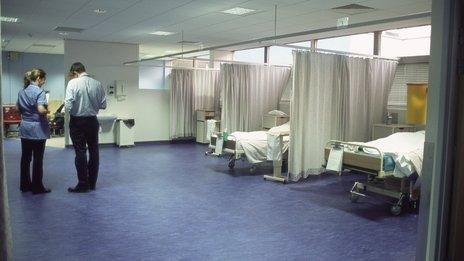NHS budget: What we aren't being told
- Published
- comments

Last week Labour was promising extra money for the NHS in England. This week it's the Tories' turn - and no doubt the Liberal Democrats will have something to say when they gather in Glasgow next week.
With all these pledges, the NHS should be in fine fettle shouldn't it? Well, no, not necessarily.
While both parties have said there will be more funding, they have been very careful not to be pinned down on the exact details.
In some ways, that is understandable. Detailed spending plans can only come after an election. But that doesn't mean that questions shouldn't be asked now.
At the Labour party conference Ed Miliband said there would be £2.5bn extra a year - to be funded from the mansion tax, a crackdown on tax dodgers, and a levy on tobacco firms.
What he didn't say - and what Labour has so far refused to give details on - is any indication about what that means once inflation is taken into account.
The expectation is that this is new money and - therefore - on top of inflation. However, at the moment all we know for sure is that over the course of five years, there will be at least an extra £12.5bn.
Smallest of margins
It sounds a lot, but the sum must be seen in terms of the NHS - the second biggest area of government spending.
The amount is almost the same as the coalition government has increased the budget by since 2010.
This year there is nearly £114bn set aside for health - that is £12.7bn more than when the coalition came to power.
But once inflation is taken into account, that amounts to an average of just 0.1% a year during this Parliament.
That means the pledge made before the last election - to increase the budget - has been met, albeit by the very smallest of margins.
And that brings us nicely on to the promises being made by the prime minister at the Conservative party conference on Wednesday.

David Cameron says there will be a real-terms increase once inflation is taken into account if the Tories win the election. But again there is no indication of just how big that rise will be (although I am told that the door is being left open to a more generous settlement than last time).
This matters. Even though the NHS was one of only two government departments to get a real-terms increase in this Parliament, many working in the health service still say it has felt like a cut.
That is because of what economists often refer to as 'health inflation'. It is basically the extra needed to cope with rising pressures from factors such as the ageing population, cost of new drugs, and lifestyle factors like obesity, and is estimated to add about 3% a year in terms of costs.
It is why throughout its history the NHS has on average been given an extra 4.5% a year.
Because the finances are so tight this time, the NHS has had to embark on an unprecedented £20bn efficiency savings target in the past few years - the equivalent of 5% per annum.
In the coming years, these pressures will continue. There is talk of a £30bn funding gap by 2020.
Could the election campaign be a game of NHS poker with all sides continually raising the stakes when it comes to the budget?